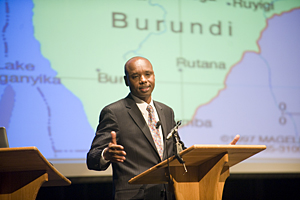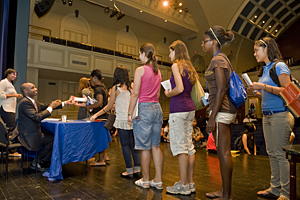
ADVERTISEMENT
- Rozovsky wins prestigious NSF Early Career Award
- UD students meet alumni, experience 'closing bell' at NYSE
- Newark Police seek assistance in identifying suspects in robbery
- Rivlin says bipartisan budget action, stronger budget rules key to reversing debt
- Stink bugs shouldn't pose problem until late summer
- Gao to honor Placido Domingo in Washington performance
- Adopt-A-Highway project keeps Lewes road clean
- WVUD's Radiothon fundraiser runs April 1-10
- W.D. Snodgrass Symposium to honor Pulitzer winner
- New guide helps cancer patients manage symptoms
- UD in the News, March 25, 2011
- For the Record, March 25, 2011
- Public opinion expert discusses world views of U.S. in Global Agenda series
- Congressional delegation, dean laud Center for Community Research and Service program
- Center for Political Communication sets symposium on politics, entertainment
- Students work to raise funds, awareness of domestic violence
- Equestrian team wins regional championship in Western riding
- Markell, Harker stress importance of agriculture to Delaware's economy
- Carol A. Ammon MBA Case Competition winners announced
- Prof presents blood-clotting studies at Gordon Research Conference
- Sexual Assault Awareness Month events, programs announced
- Stay connected with Sea Grant, CEOE e-newsletter
- A message to UD regarding the tragedy in Japan
- More News >>
- March 31-May 14: REP stages Neil Simon's 'The Good Doctor'
- April 2: Newark plans annual 'wine and dine'
- April 5: Expert perspective on U.S. health care
- April 5: Comedian Ace Guillen to visit Scrounge
- April 6, May 4: School of Nursing sponsors research lecture series
- April 6-May 4: Confucius Institute presents Chinese Film Series on Wednesdays
- April 6: IPCC's Pachauri to discuss sustainable development in DENIN Dialogue Series
- April 7: 'WVUDstock' radiothon concert announced
- April 8: English Language Institute presents 'Arts in Translation'
- April 9: Green and Healthy Living Expo planned at The Bob
- April 9: Center for Political Communication to host Onion editor
- April 10: Alumni Easter Egg-stravaganza planned
- April 11: CDS session to focus on visual assistive technologies
- April 12: T.J. Stiles to speak at UDLA annual dinner
- April 15, 16: Annual UD push lawnmower tune-up scheduled
- April 15, 16: Master Players series presents iMusic 4, China Magpie
- April 15, 16: Delaware Symphony, UD chorus to perform Mahler work
- April 18: Former NFL Coach Bill Cowher featured in UD Speaks
- April 21-24: Sesame Street Live brings Elmo and friends to The Bob
- April 30: Save the date for Ag Day 2011 at UD
- April 30: Symposium to consider 'Frontiers at the Chemistry-Biology Interface'
- April 30-May 1: Relay for Life set at Delaware Field House
- May 4: Delaware Membrane Protein Symposium announced
- May 5: Northwestern University's Leon Keer to deliver Kerr lecture
- May 7: Women's volleyball team to host second annual Spring Fling
- Through May 3: SPPA announces speakers for 10th annual lecture series
- Through May 4: Global Agenda sees U.S. through others' eyes; World Bank president to speak
- Through May 4: 'Research on Race, Ethnicity, Culture' topic of series
- Through May 9: Black American Studies announces lecture series
- Through May 11: 'Challenges in Jewish Culture' lecture series announced
- Through May 11: Area Studies research featured in speaker series
- Through June 5: 'Andy Warhol: Behind the Camera' on view in Old College Gallery
- Through July 15: 'Bodyscapes' on view at Mechanical Hall Gallery
- More What's Happening >>
- UD calendar >>
- Middle States evaluation team on campus April 5
- Phipps named HR Liaison of the Quarter
- Senior wins iPad for participating in assessment study
- April 19: Procurement Services schedules information sessions
- UD Bookstore announces spring break hours
- HealthyU Wellness Program encourages employees to 'Step into Spring'
- April 8-29: Faculty roundtable series considers student engagement
- GRE is changing; learn more at April 15 info session
- April 30: UD Evening with Blue Rocks set for employees
- Morris Library to be open 24/7 during final exams
- More Campus FYI >>
8 a.m., Sept. 24, 2010----Deogratias Niyizonkiza's incredible odyssey began when he boarded a plane in Bujumbura, Burundi, in 1994, leaving behind a country being ripped apart by genocide and civil war.
On the latest leg of this personal journey, Deo, as he is called, visited the University of Delaware on Wednesday, Sept. 22, to share his vision of hope and renewal. His visit was sponsored by UD's First Year Experience program.
Speaking to an audience of more than 600 students, staff and faculty in Mitchell Hall, the founder of Village Health Works in Kigutu, Burundi, and subject of Strength in What Remains, a book by Tracy Kidder, said that access to clean water and safe food is crucial in a country where people often have no other place to turn for help.
“A person is only fully well when he has a strong body and a strong mind and a strong spirit,” Deo, who is continuing his medical school education at Columbia University in New York City, said. “What we have done is provide much-needed health care to more than 30,000 persons.”
Deo said that a true picture of the results of the civil war that lasted from 1993-2005 could only be obtained by a first hand experience.
“Words are based on what we see around us,” Deo said. “There are things in Burundi that only the eyes can tell.”
While words may not match the atrocities committed, Deo said he believes the rest of the world has the power to say no to what happened in Burundi and Rwanda.
“What we need to do is feel compassion, to feel the pain of others,” Deo said. “This is what makes us human, and we can all do that.”
A major factor in health care situation in Burundi is a “user fee policy,” where hospitalized people who can't pay are physically detained until payment is made, Deo said.
“People run away from hospitals and die in the hands of those who practice witchcraft,” Deo said. “We believe there is something that can be done.”
Deo also related the story of villagers who teamed up to build a road that a Belgian construction firm estimated would cost $50,000 in U.S. dollars.
“One of the women said, 'we are not poor because we are lazy,'” Deo said. “The people, including women with children on their backs, and men, joined together to work for a common cause. When you get people who are suffering, they will build things, and they will be your friends.”
While education and volunteerism and donations are crucial, Deo said that the world as a whole has to do more to improve the lives of people so that situations that occurred in Burundi and Rwanda are consigned to history.
“The world has been wrong by doing something small, when it really needs to be doing so much more,” Deo said. “The fight for global social justice will be won.”
Before taking questions, Deo closed with a quote from President Franklin Delano Roosevelt, who said, “The test of our progress is not whether we add more to the abundance of those who have much. It is whether we provide enough for those who have too little.”
Relationship with Tracy Kidder
When asked what it was like working with author Tracy Kidder, Deo said, “He [Kidder] knows what he is doing, and he was doing a lot. I think the process really took off when we were in Burundi. It was very different to talk to a human being who was not just a writer, but who was opening up his heart to me.”
Kidder's book was the University's First Year Experience common reader, and the author visited campus earlier this month.
Article by Jerry Rhodes
Photos by Evan Krape



